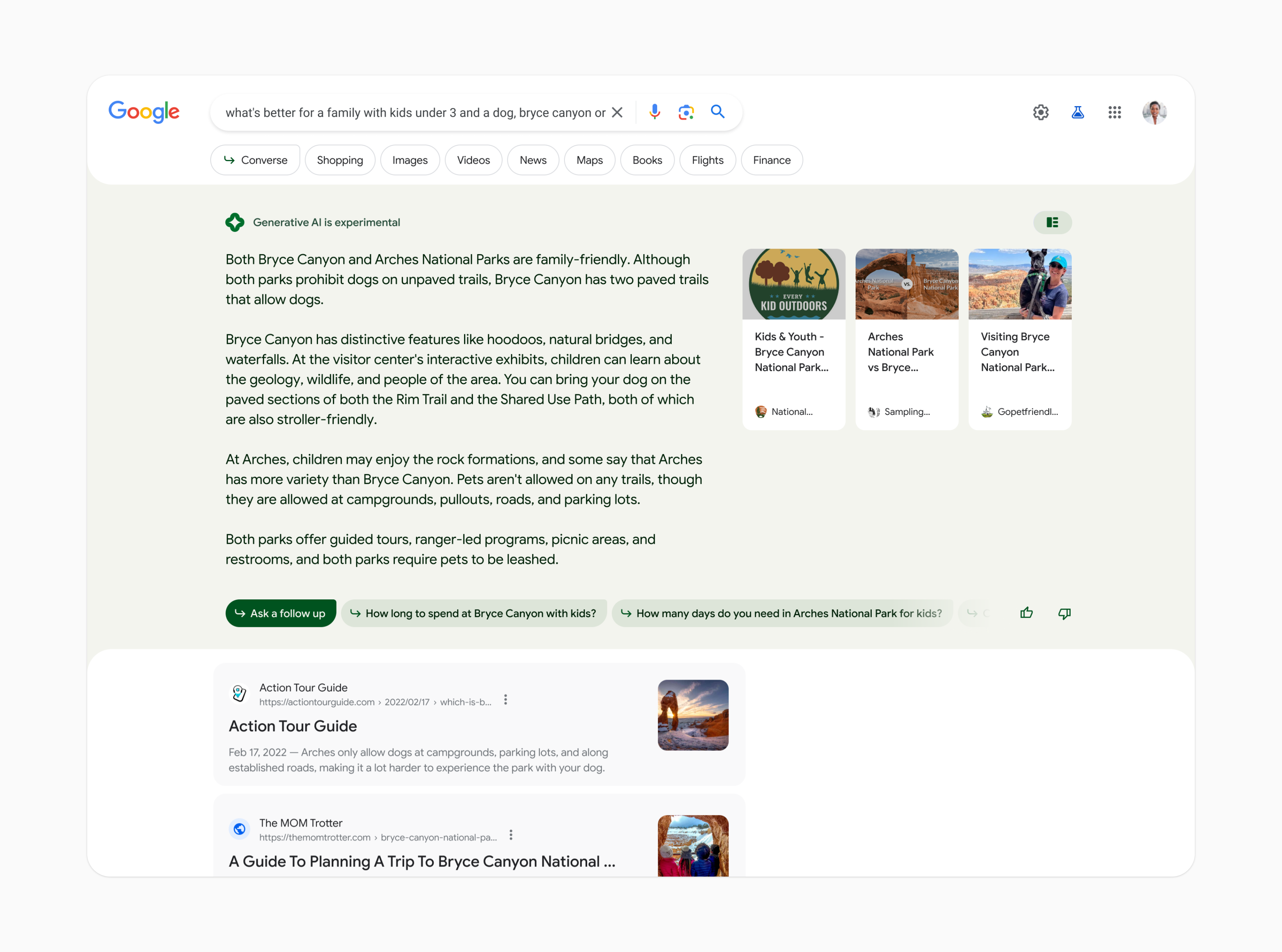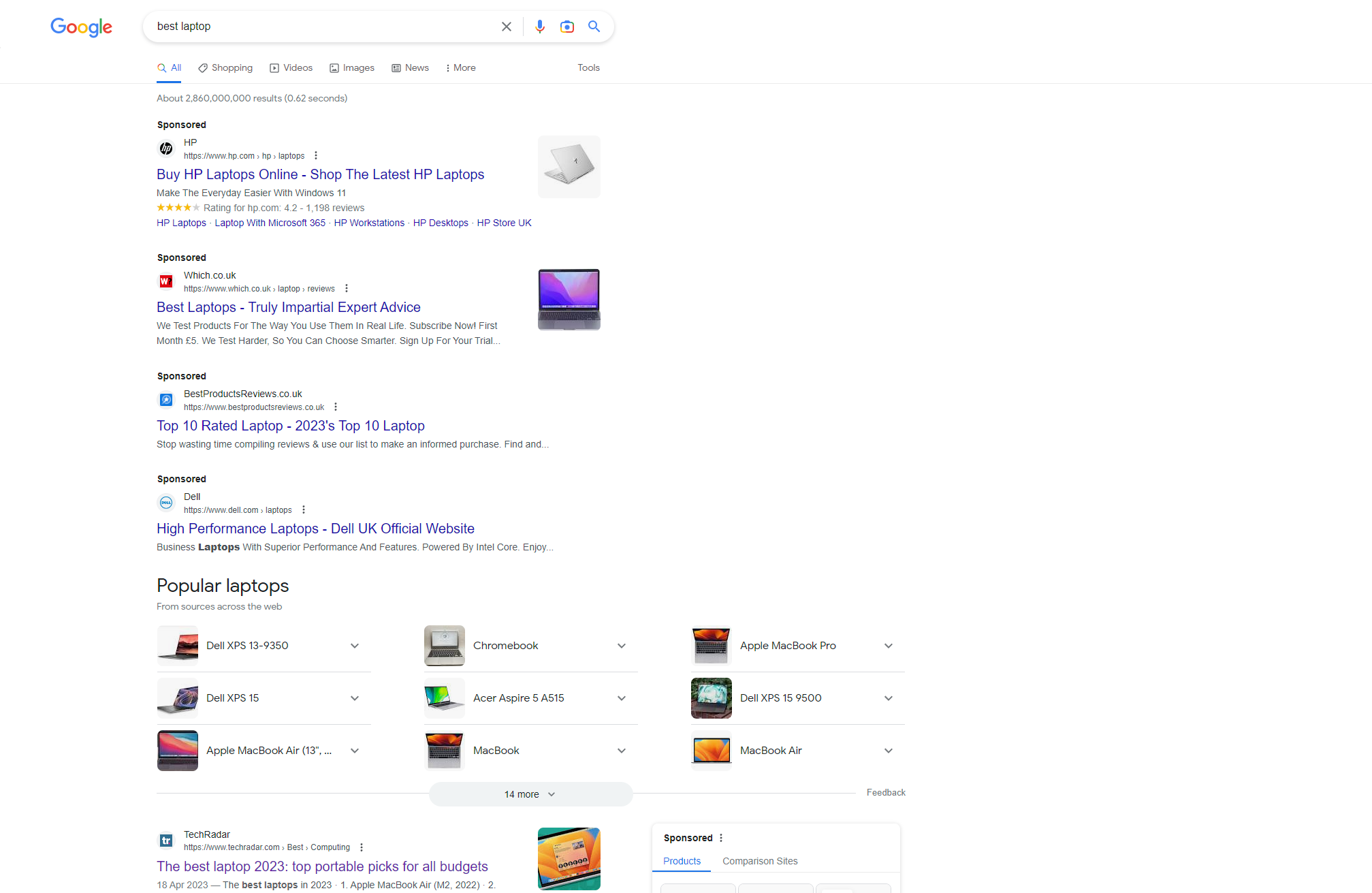Cramming AI into search results proves Google has forgotten what made it good
Snap(shot) back to reality

Sign up for breaking news, reviews, opinion, top tech deals, and more.
You are now subscribed
Your newsletter sign-up was successful
In the aftermath of Google’s I/O event, there’s a lot to get excited about - from Google’s first foray into foldable phones with the Pixel Fold to improvements to Bard, Google’s pet AI chatbot.
But it’s not chatbots that intrigued me at I/O; no, Google has more insidious plans for AI than a conversational companion that can now generate images. Search Generative Experience (SGE), a feature arriving with Google’s new ‘Search Labs’ testing platform, promises (or threatens?) to change the way we use search engines forever - and I’m worried about that.
If you want to know the what rather than the why, you can read all the details on how Google is using AI to improve search right here. In short, you can now get what Google calls an ‘AI snapshot’ when you search for something: a box that appears above the standard search results and does its best to provide an AI-generated answer to your query.
A new way to search
This doesn’t toss conventional search results in the garbage, to be clear. In a demo with The Verge, Google’s VP of Search Liz Reid punched in ‘bluetooth speaker for a pool party’ and the search engine provided three links to websites with good lists of such a product within its AI box.
They’re shoved over to one side, though with the main space occupied by an AI-generated response detailing what important features make for a good pool party sound system, along with some direct links to buy a handful of recommended products.

If, like me, you work in digital journalism, this set off alarm bells immediately. TechRadar - and just about every tech site out there - has a wealth of reviews and best-of pages detailing the products we love (and hate) for the benefit of consumers. The simple fact is that it’s a big part of what drives interest and revenue in journalism these days - and Google search is a big part of that equation.
Google’s SGE threatens to obliterate that completely. Hell, even if we’re not talking about users searching for products to buy, the ‘AI snapshot’ is big enough to shunt conventional search results out of the way - as The Verge noted, on mobile devices it can effectively remove the normal results from your screen when you hit search, since it’s positioned above those links.
Sign up for breaking news, reviews, opinion, top tech deals, and more.
Don’t panic!
It’s alright, it’s alright, Google isn’t going to wipe out the entire e-commerce industry overnight. I’m talking to myself, if that wasn’t clear. It’s true, though: SGE is very much an experimental feature right now, and one that you have to opt in to through the Search Labs platform.
This was a relief to see: after watching Microsoft barrelling ahead with putting Bing AI into everything and observing the gradual encroachment of the internet’s favorite chatbot ChatGPT into every conceivable aspect of our online lives, it’s good that Google is erring on the side of caution with this new technology. Still, it’s clear that Google views this as a long-term change to the way we use search engines, and I’m not happy about that.

Google Search’s biggest strength, in my opinion, was its perfect simplicity. Punch in some words, and the machine gives you everything the internet has to offer on the subject, with every link neatly cataloged and sorted in order of relevance. Sure, most of us will only ever click the first link it presents - god forbid we venture to the dark recesses of the second page of results - but that was enough. It didn’t need to change; it didn’t need this.
There’s an argument to be made that search AI isn’t for simple inquiries. It’s not useful for telling you the time in Tokyo right now, Google can do that fine already. It’s for the niche interrogations: stuff like ‘best restaurant in Shibuya, Tokyo for a vegan and a lactose intolerant person who doesn’t like tofu’. While existing deep-learning models might struggle a bit, we’re not that far off AIs being able to provide concise and accurate answers to queries like that.
Answer me, machine
See, that information is out there on the internet, it’s just not neatly compiled into a conveniently titled article for Google’s algorithms to easily fish out of the search barrel. An AI search engine has the power to collate that information from numerous articles in an instant, distilling it into one precise answer.
Of course, a lot of the time when people search for stuff on Google they’re simply looking for suggestions, rather than answers. Humans, by our very nature, don’t really like being told what to do: we’d often prefer to be given the options and make the decision ourselves. SGE has the potential to kill this, and kill the curiosity that search engines can spark in our minds. I’ve written about this ‘death of thought’ in the past, and it still worries me.

There’s another big problem, too. Where’s Google’s AI getting that information from? Well, from sites like us, naturally; if you search for the best laptop and the AI gives you its suggestions, it hasn’t come up with those itself - it’s merely disseminated the recommendations of dozens of tech websites into one ‘definitive’ list.
You could say "that’s not a problem for me, I still get what I was looking for", and you’d be right - but it will be. Because if all those best laptop lists suddenly become unprofitable thanks to SGE, we’re not going to waste our time and resources keeping them updated: and then Google’s AI will be working off outdated information.
It’s parasitic, in a sense; the websites are the host, and if SGE kills them off with its handy-dandy reimagining of online searches, it’ll die itself. Surely Google isn’t foolish enough to push all that content into irrelevance when its AI needs that content in order to be smart, right? Right?
When it comes down to it, I don’t want Google’s AI to answer my question - I want the search engine to direct me to an actual human expert in the subject matter. There’s a place for AI in the search space, but this isn’t it. It should be improving conventional search results, not replacing them.

Christian is TechRadar’s UK-based Computing Editor. He came to us from Maximum PC magazine, where he fell in love with computer hardware and building PCs. He was a regular fixture amongst our freelance review team before making the jump to TechRadar, and can usually be found drooling over the latest high-end graphics card or gaming laptop before looking at his bank account balance and crying.
Christian is a keen campaigner for LGBTQ+ rights and the owner of a charming rescue dog named Lucy, having adopted her after he beat cancer in 2021. She keeps him fit and healthy through a combination of face-licking and long walks, and only occasionally barks at him to demand treats when he’s trying to work from home.